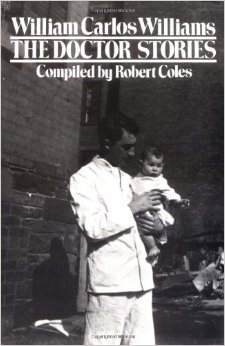“Look, you’re not out on a four-year picnic at that medical school, so stop talking like a disappointed lover. You signed up for a spell of training and they’re dishing it out to you, and all you can do is take everything they’ve got, everything they hand to you, and tell yourself how lucky you are to be on the receiving end — so you can be a doctor, and that’s no bad price to pay for the worry, the exhaustion.”
 These words of wisdom regarding medical education in the 1950s remain applicable as medical education continues to grow and evolve. They are the words of the poet Dr. William Carlos Williams, shared in the introduction to “The Doctor Stories,” compiled by Robert Coles. Dr. Coles (a psychiatrist and a writer himself) compiled these stories and poems by Williams as a tribute to the good doctor, one of the first and arguably the most prominent of the many American physician-writers. Although relatively few of Williams’ writings have to do specifically with medicine, the short stories and poems that do are all found within this little book. This makes it an excellent start for medical students and physicians into reading the incredible works of William Carlos Williams.
These words of wisdom regarding medical education in the 1950s remain applicable as medical education continues to grow and evolve. They are the words of the poet Dr. William Carlos Williams, shared in the introduction to “The Doctor Stories,” compiled by Robert Coles. Dr. Coles (a psychiatrist and a writer himself) compiled these stories and poems by Williams as a tribute to the good doctor, one of the first and arguably the most prominent of the many American physician-writers. Although relatively few of Williams’ writings have to do specifically with medicine, the short stories and poems that do are all found within this little book. This makes it an excellent start for medical students and physicians into reading the incredible works of William Carlos Williams.
Williams’ writing style is incomparable. He usually avoids quotation marks and transitions quickly from thought to dialogue to narration, often without marking the change. Beyond these stylistic marks is his writing itself: his prose is short and blunt, and he leaves out much detail. The combination of these can make many of his stories difficult to follow. Part of the reason for this, I think, is that Williams considered himself first and foremost a poet; many of these stories in prose read like a man trying to process the things he has seen. This certainly follows the trend of many physician-writers — writing as a way of reflecting and processing, a cathartic endeavor which ultimately, ideally, makes one a better doctor. This also makes sense considering Williams’ own quote when asked about how he was able to maintain, essentially, two full-time careers (writing and medicine). He said this: “It’s no strain. In fact, I find that the one often informs the other.” He implies that he was doing his best writing when he was also serving the people of his town as a physician. Williams was well-known for seeing patients all day, and then going home and writing until he fell asleep at his typewriter.
In reading these stories, Williams’ honesty is, to me, the most striking feature of his writing. Despite his sparse prose, he manages to capture the world around him with astonishing precision, accurately incorporating the language of the people he served. His honesty is most apparent when he writes about himself. He never shies away from his true feelings; he discusses, in simple ways, what it is like to be angry at patients, frustrated at a lack of sleep or sad for no apparent reason. In so little space, he creates a clear picture of what it is like to be a small-town, old-fashioned doctor. His house calls and strange appointment times may seem like relics of an era that no longer exists, but even so they reach towards something primal in medicine — they are reminiscent of a time when doctors served their patients where they were. This is so rare in today’s world that reading about it felt both refreshing and nostalgic.
“The Doctor Stories” is a good read for medical students because it offers a dramatic change from scientific journals, news articles or even contemporary fiction. I would particularly recommend it to students seeking careers in obstetrics (many of the stories talk about delivering children) and family medicine, especially in a rural area. As I already noted, William Carlos Williams remains a chief example of a physician-writer; not only was he successful and loved by the townspeople he served, he also helped to change the landscape of American poetry in the 20th century. Judging by his writing, these two aspects of him were inseparable.
“There’s nothing like a difficult patient to show us ourselves. I would learn so much on my rounds, or making home visits. At times I felt like a thief because I heard words, lines, saw people and places — and used it all in my writing. I guess I’ve told people that, and no one’s surprised! There was something deeper going on, though, — the force of all those encounters. I was put off guard again and again, and the result was — well, a descent into myself.”
We are fortunate that he did descend, and ascend again to publish his magnificent writing about 20th century medicine.
Prints, Pages, and Pagers aims to look closely at the lives of medical students and doctors, real or fiction, whose lives and experiences are told in novels, short stories, poetry, or any kind of writing. These book reviews are an opportunity for medical students to learn from the many fascinating stories produced by the field of medicine, and maybe to read something other than a textbook.




